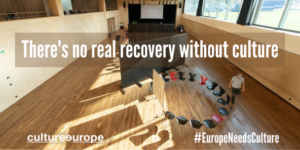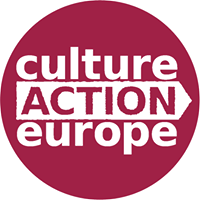EU Commission structured dialogue with the European creative sector, starting in April 2021
Author: Constanze IGBK
Invitation IAA Talk World Art Day
Warm invitation to the next digital IAA Talk on World Art Day, April 15, 2021 at 7pm CET, to celebrate this special day together. Join IAA Europe virtually and meet colleagues from visual artists organizations worldwide.
New study on artists’ working conditions published
The European Commission and stakeholders have published a new study that sheds light on the status and working conditions of artists, cultural and creative professionals.
The study looks at characteristics of employment of artists and cultural and creative professionals in EU Member States with regards to artist status and entitlements, social security, self-employment, support ecosystems and alternative financing, artistic freedom, career development and measures countering the Covid crisis.

Continue reading “New study on artists’ working conditions published”
Having the right and the means to act artistically – join the digital IAA Europe Talk 17.09.20 at 2pm
 In the late summer of 2020, IAA Europe starts a series of online debates to bring members and supporters closer together, to discuss what can be the role of artists associations today and especially their (re)union on an international level.
In the late summer of 2020, IAA Europe starts a series of online debates to bring members and supporters closer together, to discuss what can be the role of artists associations today and especially their (re)union on an international level.
3.000 cultural professionals demand: “Uphold culture in the EU budget!”
 “A deal is essential”, writes Charles Michel, president of the European Council, ahead of the EU summit on 17 and 18 July 2020, where an agreement for the EU-Multiannual Financial Framework and Recovery Plan is being sought.
“A deal is essential”, writes Charles Michel, president of the European Council, ahead of the EU summit on 17 and 18 July 2020, where an agreement for the EU-Multiannual Financial Framework and Recovery Plan is being sought.
Equally essential is a sufficient funding of culture in the EU budget, now, and in the coming years.
3000 cultural professionals, artists, creators, authors stand behind Culture Action Europe’ petition, which you can sign here.
These voices make it clear: „There is no proper recovery without culture and no culture without proper budget.“
Many artists like a.o. Björk, Marina Abramovich, Agnieszka Holland, Isabel Coixet, Milo Rau, Jean Michel Jarre, Anne-Teresa Keersmaeker and many more are loud on calling the EU and national leaders to “be bold” and invest in culture at the EU level. Read their letter here.
Culture Action Europe General Assembly
 On 12.06.2020, more than 90 members of Culture Action Europe (CAE) met for a digital General Assembly, for board elections and for agreements on further joint initiatives and priorities in 2020.
On 12.06.2020, more than 90 members of Culture Action Europe (CAE) met for a digital General Assembly, for board elections and for agreements on further joint initiatives and priorities in 2020.
The Board reported on activities in 2019 and 2o2o along Culture Action Europe’s strategic goals:
– Advocacy for the culture sector against the background of negotiations of the new EU Multiannual Financial Framework 2021-2027 (MFF) and in particular for an appropriate recognition of culture in the new “Next Generation EU” instrument and as part of the “REACT-EU” initiative
– Working conditions in the cultural sector in Europe, with particular attention to income conditions and social security for artists
– Freedom of expression and cultural rights, with the aim of drawing up the necessary legal frameworks for this at EU level and in the member states
– Artistic and cultural research, especially the so-called STEAM practices: Science, Technology, Engineering, Arts and Mathematics
The role of culture for sustainable living as well as the digital paradigm shift in the cultural sector – also accelerated by COVID19 – emerged as possible new and accompanying focal points in the discussions following the Board’s report.
In view of the COVID19 crisis, Culture Action Europe, together with the European Cultural Foundation, has been mapping measures and emergency initiatives across Europe (compensations, dedicated funding, combined efforts or public and private actors, information sharing etc.) to tackle the effects of the crisis on the arts, culture, creative sectors and cultural heritage.
CAE and its members have addressed political actors at EU and member states level with several letters, on the one hand to clarify how beneficiaries of the Creative Europe programme should currently deal with the challenges posed by COVID19, but also to continue to advocate doubling the budget for Creative Europe in the new MFF.
What this means in figures: Of the 2021-2027 budget for Creative Europe proposed by the EU Commission some time ago, only a smaller amount of 1.5 billion is now included in the current MFF proposal. If this amount were actually doubled, the total budget for Creative Europe 2021-2027 would still not even correspond to 0.4% of the new “Next Generation EU” development instrument!
Simona Neumann (Managing Director of Timisoara 2021 – European Capital of Culture) was re-elected to the Board of Culture Action Europe. Further candidates were Celia Grau (Opera Europa Advocacy Coordinator) and Teemu Mäki (IAA Europe).
More information, the agenda and further summaries of the assembly can soon be found on the website of Culture Action Europe.


